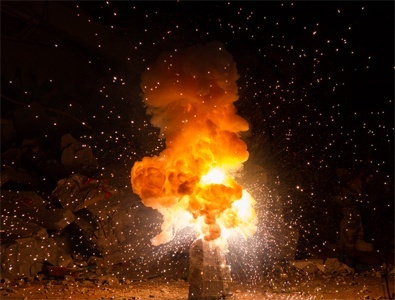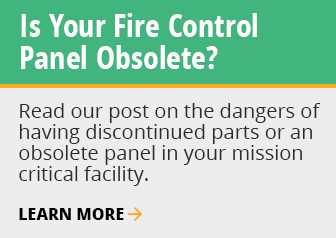Faults in Fire Alarm Systems
When fire alarm panels are in trouble condition, it can be difficult to find the root cause of the problem. Trouble signals occur due to ground faults, circuit problems, battery faults, or other failures within the system. Watch this video as ORR VP of Engineering Lee Kaiser walks us through the common causes for many trouble signals and the cures to troubleshooting them.
Video Transcript
Lee: "The next thing, the next problem is trouble conditions. We need to dive deeper into that because we know that there are a lot of buildings out there that have recurring trouble problems on the fire alarm systems. We're gonna talk and spend some time telling you about what could happen with trouble conditions being left on the panel.
There's sort of four categories for common intermittent troubles. Ground faults, and we'll explain what those are, circuit problems, battery faults and device failures.
Ground Faults
Ground faults, okay? Let me ask you a little electrical question. In your house when I'm wiring up a new receptacle, how many wires do I bring to that receptacle usually?"
Audience: "Three."
Lee: "Three. What colors are those wires?"
Audience: "Black, white, and green."
Lee: "Black, white, and green or, or bare copper. There's a hot and a neutral and a ground. Well, fire alarm systems are different. We don't run three wires. We only run two. We run a hot and a neutral basically, or a positive and a negative to the devices and we don't run a ground.
When our systems find a path to ground by a bare wire touching grounded metal, then we get a ground fault on our panel. And those unintentional groundings of the electrical circuit can cause problems with the panel. It causes a trouble. Our fire panels are arranged to sense ground fault conditions. So, why can they happen?
First off because an exposed wire touches grounded metal, usually because of a poor wiring installation. It may not be throughout the whole system. It may be just at a simple device, shorts caused over time, and other trades tightening wires. So imagine, let's say that above here was the CEO's office and he wanted a new bathroom put in.
We'd hire a plumber to come in and help run some pipes for this new bathroom. As he's putting his pipe up he just needs another couple inches, so he pushes really hard. Well while he does that he tightens up one of the fire alarm cables that was already up there above the ceiling and it strips a little bit of the insulation off the wire. And now we've got bare metal touching some place and causes a ground fault. Those kind of things happen.
I know another story of a building where there was a smoke detector at the top of a stairwell. At the top of the stairwell was the building roof. Smoke detector up there inside a metal injunction box. And now the sun, as it would go up during the day and, and heat the roof, it would make the top of the stairwell warm. Somewhere around 2:00 in the afternoon when it would start to get hot up there, there'd always be a ground fault condition that would happen.
What was happening was the heat at the top of the stairwell would cause, there was a wire that was very close to the box that had no insulation on the wire and it would expand just a little bit and bend and ground itself out. And then when the sun went down, it would cool down and contract and it would go away. It was this kinda intermittent trouble condition that was hard to find.
Finding Ground Faults
So how do you find them? Well first off, ground faults are one of the funniest, so to speak, troubles for a technician to go out and find. Usually you need a pretty experienced technician that has good troubleshooting skills, has seen some things happen with installation in the field, kinda knows what they're looking at.
They need good instrumentation so that they can measure the resistance to ground as they go along the circuit and sort of locate where the ground fault is. The other thing they need to have is good investigative skills because sometimes, like I said, other trades are tightening wires and it'll be something that happened in the building that caused the change. They need to be able to interview the facilities people in the building to figure out what has happened to sort of narrow down, where the problem might be. So that's ground faults.
Circuit Problems
Circuit problems, okay? In the category of circuit problems will be broken or disconnected wires. That'll cause an open circuit and a trouble at the panel. On conventional circuits, IDC, indicating device circuits at the end of that there's an end of line resistor. That sort of under normal conditions sets the current flow.
That resistor will go bad from time to time. And frankly it's a good place to look for when you have trouble, check the end of line resistor. Sometimes people in the building they see this juncture box and they open it up. There's one little cable and one little resistor in there and they say 'what's this for' and pull that out. 'I don't need that clip.' Then all of a sudden they've got a trouble in their panel. So that can also happen out there. Again, solution for them is just to repair it; fix and don't ignore those problems. If you're out there troubleshooting the system, check the end of line resistors.
Recommended Wire Types
Another thing is use recommended wire types. Sometimes in this category there can be interference problems from other environmental criteria in the building. We'll talk about radio frequency interference, electromagnetic interference. If you're not using the correct wire type on your system, you can be affected by those. All the panel manufacturers require you to use or you to install certain types of wire. Let's say it's 3:00 in the afternoon on a Friday. The technician wants to get out of there. Whatever's on the truck is thrown in the building. You know, that's when we can run into problems sometimes.
Battery Faults
Another area is battery faults. The batteries in a system act as the backup power source when the main power goes down and those batteries can go bad from time to time. You can also have the problem with the charging circuits to keep those charged up. Basically, the solution is to inspect it, see what's wrong, see if the battery is okay, check the voltage, and then if it's not, simple fix. I just need to replace the batteries.
The other thing on the charging circuits; we always make sure that the technicians use the correct fuses. If you don't, you can sometimes put in too large of a fuse and cause a problem with the circuit. That's a little bit of a finer point there.
Device Failures
Finally in troubles are device failures. The smoke detectors above our heads or other devices that can fail out there can cause a trouble from dust and contamination. The sensors inside the detectors can be a problem. Addressable devices can self-diagnose problems and tell you that there's a problem. That would be one reason for a trouble. We generally recognize that failures tend to increase as a system ages and starts to get towards the end of its useful life. Detectors last shorter in the field sometimes than panels do.
A rule of thumb is a smoke detector will last as it's installed in the building about 15 years. That's probably a good rule of thumb. And then as you get towards that 15-year mark and you have a fuse starting to fail, you may just wanna go ahead and replace 'em all. This will help you to stop having those trouble problems due to device failures.
I think this should be pretty obvious by now, but the real problem with unresolved trouble conditions is that you might prevent the system from operating when there's a fire in your building. If we leave these things, let these things go, the system just may not work when we need it. It's not obvious that there's a major problem because it's a pretty fine point with some wiring or a circuit or someplace that we're just not used to dealing with.
But if our panel says that there's a trouble on it, we better be seeking to fix it, so that we don't have problems. Ultimately, the detectors may not report smoke, the notification appliance may not operate correctly, which puts life safety at risk and we'll repeat that over and over. From a business continuity perspective, this could put your business at risk by having a fire and letting too much damage occur, such that the building's not repairable."
Thank you for watching this segment on Trouble Signals and Conditions within your system. This video wraps up Problem 2 from our Causes and Cures for the Top 7 Fire Protection Challenges Seminar. If you still cannot find the root of the trouble signals your system is experiencing, reach out to us for an expert consultation. If you're interested in downloading our updated NFPA inspection, testing and maintenance guide, click the link below.






